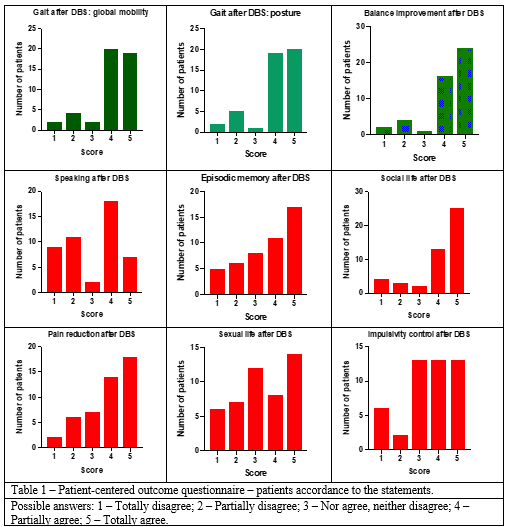Session Information
Date: Tuesday, September 24, 2019
Session Title: Parkinsonisms and Parkinson-Plus
Session Time: 1:45pm-3:15pm
Location: Agora 3 West, Level 3
Objective: To evaluate patient-centered outcomes after deep brain stimulation in Parkinson’s disease.
Background: Deep brain stimulation (DBS) is an effective treatment for Parkinson’s disease (PD) patients. Long-term outcomes have demonstrated sustained improvement in motor symptoms. However, few studies have evaluated patient-centered outcomes (PCO).
Method: A PCO questionnaire was administered to PD patients post-DBS. It measured outcomes on mobility, gait, postural instability, cognitive, speaking and psychiatric symptoms, sexual functions, pain, social life, and issues related to the DBS device. All questions were scored on a five-point Likert scale, where 4 and 5 points were the most favorable outcomes. Demographic data and Hoehn & Yahr scale (H&Y) before surgery was collected. Data on DBS therapy included the stimulation target and electric parameters.
Results: Forty-seven patients answered the questionnaire (55.3% males). Mean age was 58.3y (SD 8.7). Mean H&Y stage was 3.3 (SD 0.6), and mean DBS therapy duration was 25.5 months. Subthalamic nucleus (STN) was the target in 38 (80.8%), and Forel’s field in 9 patients. Mean amplitude, frequency and pulse-width were 2.7 V, 158 Hz and 64.5 ms. Mobility: 89.4% of patients agreed that DBS improved walk velocity in small distances (100 m), and 80.9% agreed that DBS facilitated walk (1 km). Postural instability: 85.1% of patients agreed they have better balance and 76.6% agreed they have less falls. Pain was reduced in 68.1% of patients, and sexual performance was better for 42.6%. Anxiety was reduced for 72.3% of patients, whereas depression was reduced for 80.8%. Most patients (80.6%) agreed they feel better during social activities. On the other hand, 42.6% experienced worsening of speaking, and 23.4% referred worse episodic memory. DBS device was not a problem for 85.1%. There was a non-significant trend towards lower grades in patients who had Forel’s field surgical target (mean score 162.9) compared to STN (mean score 183.3). A multivariable regression analysis showed younger age as a predictive factor for good outcomes after DBS surgery. Overall mean grade (0 to 10) for patient satisfaction with DBS therapy was 8.9, and 96.7% would undergo the surgical treatment again
Conclusion: After an average of 2 years post-DBS surgery, the majority of patients were satisfied, felt they had made the correct decision to undergo DBS and would choose to have DBS again.
To cite this abstract in AMA style:
R. Moraes, J. Freitas, R. Ferreira, P. Pereira, P. Terzian, F. Godinho, M. Rocha. Patient-Centered Outcomes of Deep Brain Stimulation in Parkinson’s Disease [abstract]. Mov Disord. 2019; 34 (suppl 2). https://www.mdsabstracts.org/abstract/patient-centered-outcomes-of-deep-brain-stimulation-in-parkinsons-disease/. Accessed February 10, 2026.« Back to 2019 International Congress
MDS Abstracts - https://www.mdsabstracts.org/abstract/patient-centered-outcomes-of-deep-brain-stimulation-in-parkinsons-disease/

